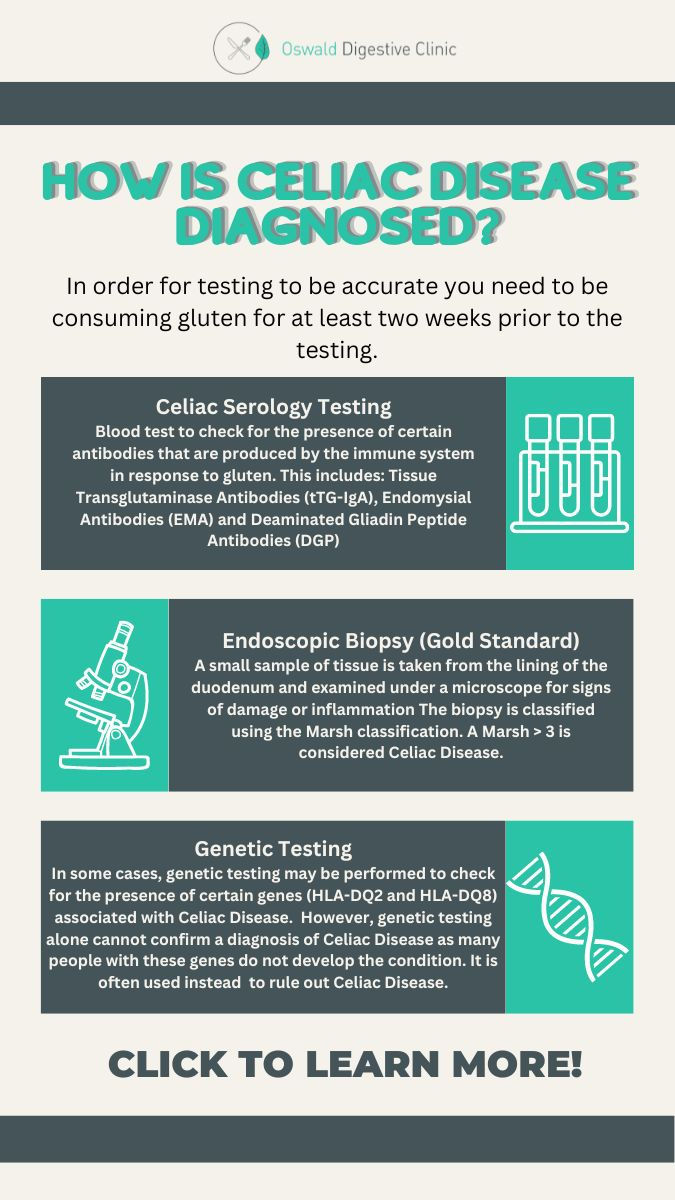Celiac Disease Test: How Is Celiac Disease Diagnosed?
Hi everyone. Welcome back to our channel.
Celiac Disease is a chronic condition that affects around 1% of the population, and it can lead to a range of uncomfortable symptoms and potentially serious complications if left untreated.
In today's video, we'll be diving into what is celiac disease and what are the associated symptoms?
How is celiac disease diagnosed?
What foods contain gluten and should be avoided?
And lastly, gluten-free diet plan, tips for beginners.
Hi, I'm Katie Bailey. I'm a gut health dietician at Oswald Digestive Clinic, where we help individuals improve and resolve their bothersome gut issues.
If you're interested in learning more about gut health, I'll link our free guide 5 Ways to Improve Your Gut Health HERE.
Alright, let's get started On today's topic.
[Video Transcript Below Video]
What is celiac disease and what are the associated symptoms?
Well, celiac disease is an autoimmune disorder where the immune system attacks the lining of the small intestines when gluten is consumed.
Now, gluten is a protein that is found in wheat, barley, and rye.
When someone with celiac disease consumes gluten, their immune system mistakenly thinks that it's a threat and will actually launch an attack on the small intestines.
The attack damages the tiny finger-like projections called vii, that line the small intestines and are responsible for absorbing the nutrients from our food.
As the villi become damage, this decreases the body's ability to absorb essential nutrients, which can lead to various health issues.
Symptoms of celiac disease are going to vary from person to person, and some individuals may not experience any noticeable symptoms at all.
However, common symptoms include a lot of digestive issues like bloating, diarrhea, constipation, nausea and vomiting, abdominal pain, as well as malnutrition, weight loss, anemia, fatigue, bone or joint pain, skin rashes, headaches, and depression and anxiety.
It's also important to note that these symptoms are also associated with other conditions, which is why proper diagnosis is crucial.
So how is Celiac disease diagnosed? (Celiac Disease Testing)
Well, diagnosing celiac disease can be a multi-step process as there's no single definitive test.
The diagnostic process typically involves a combination of some blood testing, endoscopic procedures, as well as sometimes genetic testing.
The first step in diagnosing celiac disease generally is serology testing, which is a blood test that's going to check for the presence of certain antibodies that are produced by the immune system in response to gluten.
And these antibodies are TTG-IGA, EMA, as well as DGP. If the blood tests are positive, it indicates a high likelihood that the person has celiac disease, but further testing is typically used to confirm as this test is not a hundred percent specific to celiac disease if the blood tests suggests celiac disease.

The next step is an endoscopic procedure called a biopsy, which is going to examine the small intestines, and this is considered the gold standard for testing for celiac disease.
During the procedure, a small sample of the tissue taken from the lining of the duodenum, which is the first part of the small intestines, and it's examined under a microscope for signs of damage and inflammation.
Now the biopsy is classified using the marsh classification, so a marsh of greater than three is going to be considered celiac disease.
In some cases, genetic testing can be performed to check for the presence of certain genes associated with celiac disease.
These genes are HLA-DQ2 and HLA-DQ8.
However, genetic testing alone cannot confirm a diagnosis of celiac disease. As many people with these genes may not develop the condition, it's used more to rule out celiac disease.
Eat Gluten For Accurate Labs
It's important to note that the diagnostic process for celiac disease should be undertaken when someone is still consuming gluten.
Eliminating gluten from your diet prior to testing can lead to inaccurate results.
So one should be consuming at least three grams of gluten per day, which is the equivalent to about two slices of bread prior to testing in order to avoid inaccurate results.
What foods contain gluten and should be avoided?
So if you have celiac disease, it's essential to avoid foods with gluten. Some common sources of gluten include wheat, barley, and rye malt and malt beverages.
So malt is derived from barley. And then be aware of your processed foods, your sauces and seasonings, because these, a lot of these can be made with gluten ingredients. Transitioning to a gluten-free diet can be challenging at first, but here are some tips to help get you started.
Read your labels very carefully. You want to look at the full ingredient list and see if they have any gluten ingredients.
But what's even easier is to try to find labels that have the gluten-free label already on there so you know that it's certified gluten-free stock up on gluten-free alternatives.
That way you always have a safe option to turn to make sure you've got your gluten-free breads and pastas and cereals or other baked goods, or just naturally gluten-free items like rice or quinoa and that a lot of stores now do have specific gluten-free sections or aisles to make it a lot easier to find, prepare your meals at home.
So cooking at home allows you to control the ingredients and make sure that they are gluten-free, carry gluten-free snacks. When you're on the go, you want to carry things that you know are gluten-free so that you don't end up somewhere and not have anything to turn to.
So things like fruits and vegetables and nuts or gluten-free granola bars or other gluten-free labeled snacks.
Lastly, get familiar with hidden sources of gluten or cross-contamination risks because the more knowledge you have about gluten, the easier the diet will be to follow.
Conclusion
To wrap up our topic for today, diagnosing celiac disease is a multi-step process that includes blood tests, endoscopic procedures, and sometimes genetic testing.
If you suspect that you may have celiac disease, it's essential that you consult with a healthcare professional for proper testing and treatment of the condition.
And remember, it's super important to make sure you are still consuming gluten in your diet when you get the testing done to avoid inaccurate results.
Okay, so that's it for today's topic.
If you like this video, please hit the like button and subscribe for more nutrition videos.
If you're interested in working with our clinic, you can click the link here to schedule an appointment.
We do take insurance and you can find more information about that on our website.
Thank you for watching. I'll see you next time.
Bye.
If you'd like to explore any of this information further or obtain an individualized nutrition plan, you can schedule an initial appointment at our clinic. We also take insurance and some of our clients get full coverage, which is great.
Curious about what type of gut you have? Take our Free Quiz now!











